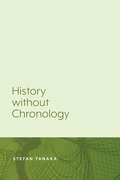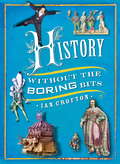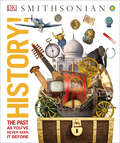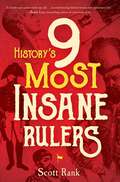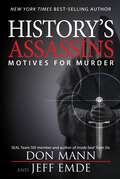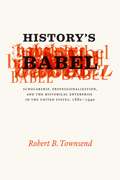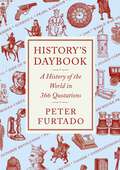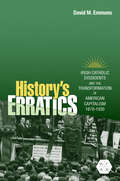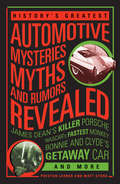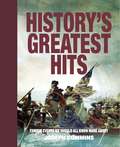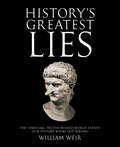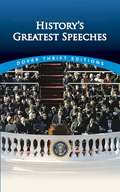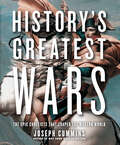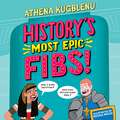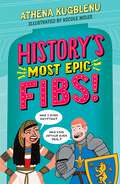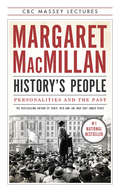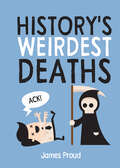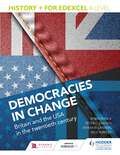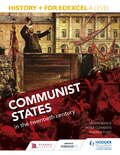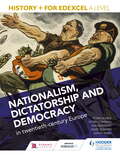- Table View
- List View
History without Chronology
by Stefan TanakaAlthough numerous disciplines recognize multiple ways of conceptualizing time, Stefan Tanaka argues that scholars still overwhelmingly operate on chronological and linear Newtonian or classical time that emerged during the Enlightenment. This short, approachable book implores the humanities and humanistic social sciences to actively embrace the richness of different times that are evident in non-modern societies and have become common in several scientific fields throughout the twentieth century. Tanaka first offers a history of chronology by showing how the social structures built on clocks and calendars gained material expression. Tanaka then proposes that we can move away from this chronology by considering how contemporary scientific understandings of time might be adapted to reconceive the present and pasts. This opens up a conversation that allows for the possibility of other ways to know about and re-present pasts. A multiplicity of times will help us broaden the historical horizon by embracing the heterogeneity of our lives and world via rethinking the complex interaction between stability, repetition, and change. This history without chronology also allows for incorporating the affordances of digital media.
History without the Boring Bits: A Curious Chronology of the World
by Ian CroftonConventional chronologies of world history concentrate on the reigns of kings and queens, the dates of battles and treaties, the publication dates of great books, the completion of famous buildings, the deaths of iconic figures, and the years of major discoveries. But there are other more interesting stories to tell - stories which can bring the past vividly and excitingly to life. Imagine a book that tells you the date of the ancient Roman law that made it legal to break wind at banquets; the name of the defunct medieval pope whose putrefying corpse was subjected to the humiliation of a trial before a court of law; the identity of the priapic monarch who sired more bastards than any other king of England; and last but not least the date of the demise in London of the first goat to have circumnavigated the globe - twice. Imagine a book crammed with such deliciously disposable information, and you have History without the Boring Bits. By turns bizarre, surprising, trivial, and enlightening, History without the Boring Bits offers rich pickings for the browser, and entertainment and inspiration aplenty for those who have grown weary of more conventional works of history.
History without the Boring Bits: A Curious Chronology of the World
by Ian CroftonConventional chronologies of world history concentrate on the reigns of kings and queens, the dates of battles and treaties, the publication dates of great books, the completion of famous buildings, the deaths of iconic figures, and the years of major discoveries. But there are other more interesting stories to tell - stories which can bring the past vividly and excitingly to life. Imagine a book that tells you the date of the ancient Roman law that made it legal to break wind at banquets; the name of the defunct medieval pope whose putrefying corpse was subjected to the humiliation of a trial before a court of law; the identity of the priapic monarch who sired more bastards than any other king of England; and last but not least the date of the demise in London of the first goat to have circumnavigated the globe - twice. Imagine a book crammed with such deliciously disposable information, and you have History without the Boring Bits. By turns bizarre, surprising, trivial, and enlightening, History without the Boring Bits offers rich pickings for the browser, and entertainment and inspiration aplenty for those who have grown weary of more conventional works of history.
History!: The Past as You've Never Seen it Before (DK Knowledge Encyclopedias)
by DKJourney back in time and marvel at the history of our world like never before with this children's encyclopedia perfect for curious kids. Forming part of a fantastic series of kid's educational books, this bold and brilliant kid's encyclopedia uses ground-breaking CGI imagery to reveal the world as you've never seen it before. Informative, diverse in subject matter, easy-to-read and brimming with beautiful graphics, young learners can explore the incredibly detailed cross-sections and cutaways that reveal the inner workings of just about everything! This charming children&’s encyclopedia opens the world in new ways, with: - Packed with facts, charts, timelines, and infographics that cover a vast range of topics.- Encompassing a visual approach with illustrations, photographs and extremely detailed 3D CGI images.- Crystal clear text distills the key information.- DK's encyclopedias are fact-checked by subject experts to offer accuracy beyond online sources of information.This fully-updated edition of Knowledge Encyclopedia History! is the perfect encyclopedia for children aged 9-12, ideal for inquisitive minds, bringing key moments in history to life, from exploring the lives of early humans to visiting the Vikings, learning about The Industrial Revolution, and looking towards a greener future! Jam-packed with fun facts about the world, including fascinating statistics, maps, timelines, graphics, and superb photorealistic cross-sections, young history lovers can peer inside ancient buildings, marvel at elaborate outfits, and get close to the battles of history!Explore, Discover And Learn!DK's Knowledge Encyclopedia History! uncovers the marvels of our world in unprecedented detail and with stunning realism. Encompassing engaging historical facts about our world, you can spend quality time diving into the past with your children, accompanied by impressive visuals to engage their senses. A must-have volume for curious kids with a thirst for knowledge, this enthralling children&’s encyclopedia is structured in such a way that your child can read a bit at a time, and feel comfortable to pause and ask questions. Doubling up as the perfect gift for young readers, who are always asking questions about our planet! At DK, we believe in the power of discovery. This thrilling kid&’s encyclopedia is part of the Knowledge Encyclopedia educational series. Celebrate your child&’s curiosity as they complete the collection and discover diverse facts about the world around them. Dive into the deep blue with Knowledge Encyclopedia Ocean! Travel back in time to when dinosaurs roamed the earth with Knowledge Encyclopedia Dinosaur! And hone your knowledge on how the human body works with Knowledge Encyclopedia Human Body! Whatever topic takes their fancy, there&’s an encyclopedia for everyone!
History's 9 Most Insane Rulers
by Scott RankFew mixtures are as toxic as absolute power and insanity. When nothing stands between a leader's delusional whims and seeing them carried out, all sorts of bizarre outcomes are possible. This book will look at the lives of the nine most mentally unbalanced figures in history. Some suffered from genetic disorders that led to schizophrenia, such as French King Charles VI, who thought he was made of glass. Others believed themselves to be God&’s representatives on earth and wrote religious writings that they guaranteed to the reader would get them into heaven, even if these leaders were barely literate. Whether it is Ottoman Sultan Ibrahim I practicing archery on palace servants or Turkmenistan president-for-life Akhbar Turkmenbashi renaming the days of the week after himself and constructing an 80-foot-tall golden statue that revolves to face the sun, crazed leaders have plagued society for millenia. While such stories are amusing, this book also contemplates the addictive nature of power and the effects it has on those who cling to it for too long. It explores how leaders can undertake the extraordinarily complicated job of leading a country without their full mental faculties and sometimes manage to be moderately successful. It examines why society tolerates their actions for so long and even attempts to put a facade of normalcy on rulers, despite everyone knowing that they are mentally unstable. The book also explores if insane rulers are a relic of the age of monarchs and will die out in the age of democracy, or if they will continue to plague nations in the twenty-first century. Finally, as many armchair psychologists question the mental health of Donald Trump and other populist politicians in the United States and Europe, all but diagnosing them with mental illness, this book sets to show that truly insane rulers are categorically different in the ways they endanger their population.
History's Assassins: Motives for Murder
by Don MannA fact-based book that highlights political assassins in history. The book includes the stories of the assassins rather than just their famous victims. The book dissects selected political assassinations and and why the assassins acted; detail stheir political goals, addresses why they chose the methods they chose, and describes the ultimate outcome of the assassination. In many cases, the assassinations were not effective and actually worked against the stated goals of the assassins. People of questionable sanity and cases where the act was strictly personal are not included. For the more modern subjects, there is supporting documentation with detailed accounts written at the time in question. However, with some of the historic cases, specifics on methodology, coconspirators, etc. are not well known or there are conflicting accounts. In such cases, reasoned dramatizations tare used o ensure the stories are entertaining to the reader as well as educational.The book is organized chronologically with examples from Ancient Persia and Rome and ending with several of the 19th and 20th Centuries&’ high profile assassinations. The assassins and the victims are representative of men and women, and eastern and western civilizations.
History's Babel: Scholarship, Professionalization, and the Historical Enterprise in the United States, 1880–1940
by Robert B. TownsendFrom the late nineteenth century until World War II, competing spheres of professional identity and practice redrew the field of history, establishing fundamental differences between the roles of university historians, archivists, staff at historical societies, history teachers, and others. In History’s Babel, Robert B. Townsend takes us from the beginning of this professional shift—when the work of history included not just original research, but also teaching and the gathering of historical materials—to a state of microprofessionalization that continues to define the field today. Drawing on extensive research among the records of the American Historical Association and a multitude of other sources, Townsend traces the slow fragmentation of the field from 1880 to the divisions of the 1940s manifest today in the diverse professions of academia, teaching, and public history. By revealing how the founders of the contemporary historical enterprise envisioned the future of the discipline, he offers insight into our own historical moment and the way the discipline has adapted and changed over time. Townsend’s work will be of interest not only to historians but to all who care about how the professions of history emerged, how they might go forward, and the public role they still can play.
History's Daybook: A History of the World in 366 Quotations
by Peter FurtadoEvery day of the year carries the memory of great and terrible events. From the founding of Rome to the 21st century's war on terror, History's Daybook presents a vivid, day-by-day perspective on 2,500 years of human history through the medium of 366 quotations, each of which is tied to the anniversary of a celebrated historical event, capturing its essence with the immediacy of the eye-witness or the narrative flair of the chronicler. In History's Daybook, every day becomes a window on the past: on March 15, 44 BC, blood flows in the Roman Senate as Julius Caesar falls victim to the thrusting daggers of Brutus and his co-conspirators; May 1, 1851 brings a visit to London's Great Exhibition in the company of the novelist Charlotte Brontë; on June 28, 1919, in the Hall of Mirrors of the Palace of Versailles, brokenspirited, German delegates sign the Treaty that brings the Great War to its fateful conclusion; on August 16, 1665, we walk the silent streets of plague-ravaged London with the diarist Samuel Pepys; and on September 11, 2001 we watch in horror as the Twin Towers topple and the world changes forever. History's Daybook embraces a wide range of voices, moods, and registers, from the powerful to the impoverished, the revolutionary to the reactionary, the propagandist to the idealist, and the joyful to the grief-stricken. Both engrossing anthology and informative overview of world history, History's Daybook offers the reader entertainment and instruction in equal measure: it is the ideal gift book for the history buff.
History's Erratics: Irish Catholic Dissidents and the Transformation of American Capitalism, 1870-1930 (Working Class in American History)
by David M. EmmonsAs Ice Age glaciers left behind erratics, so the external forces of history tumbled the Irish into America. Existing both out of time and out of space, a diverse range of these Roman-Catholic immigrants saw their new country in a much different way than did the Protestants who settled and claimed it. These erratics chose backward looking tradition and independence over assimilation and embraced a quintessentially Irish form of subversiveness that arose from their culture, faith, and working-class outlook. David M. Emmons draws on decades of research and thought to plumb the mismatch of values between Protestant Americans hostile to Roman Catholicism and the Catholic Irish strangers among them. Joining ethnicity and faith to social class, Emmons explores the unique form of dissidence that arose when Catholic Irish workers and their sympathizers rejected the beliefs and symbols of American capitalism. A vibrant and original tour de force, History’s Erratics explores the ancestral roots of Irish nonconformity and defiance in America.
History's Greatest Automotive Mysteries, Myths and Rumors Revealed: James Dean's Killer Porsche, NASCAR's Fastest Monkey, Bonnie and Clyde's Getaway Car, and More
by Matt Stone Preston Lerner"Chock-full of amusing car-related trivia and miscellany." —Detroit NewsDid you know that after James Dean's death behind the wheel of his Porsche 550 Spyder, parts of the car were sold off, and said parts then cursed their new owners? (Or did they?) Did you know Bonnie and Clyde stole Ford V-8s almost exclusively as getaway cars because they were the fastest cars of their day—and that Clyde wrote Henry Ford a thank-you note? Did you know that a monkey by the name of Jocko Flocko once won a Grand National race? (NASCAR Hall of Fame driver Tim Flock helped.) Rumors, myths, and fantastic stories have swirled around the automobile for over a century. This fascinating collection compiles funny stories and a trunkful of trivia: What was the first car to break the sound barrier? Who won the first Indy 500? What kind of car was dancer Isadora Duncan in when she was killed? What car performed the most spectacular stunt in the James Bond movie oeuvre? In all of these cases, the answers may not be what you think."Entertaining stories of vehicular crime, racing, moviemaking and various mishaps and mayhem." —The New York Times
History's Greatest Hits
by Joseph CumminsIn this unillustrated edition, Joseph Cummins recounts thirty-seven of the best-known episodes from the past. Not only does he relate and re-create these events in captivating fashion, he also analyzes their impact on subsequent history and explains the reasons for their enduring fame. Accompany Hannibal over the Alps with a herd of elephants and learn what led him to attempt such a daunting and outlandish undertaking. Cross the Delaware River with George Washington to discover how his subsequent raid on British-held Trenton, New Jersey, changed the course of the American Revolution. Follow the British Light Brigade into the "Valley of Death" during the Crimean War and find out how this farcical military blunder was immortalized through its rendition in verse.- We've all heard of these momentous events, but how much do we really know about them? And why do we remember them?- Inside readers find thirty-seven in-depth accounts of the greatest events in history.Gripping, revealing, and informative, History's Greatest Hits is a fascinating read for history buffs, or anyone seeking to understand the world we live in today.
History's Greatest Lies: The Startling Truths Behind World Events Our History Books Got Wrong
by William WeirGet the real facts you weren’t taught in school and learn how these myths have survived for so long.Discover the stories behind history’s greatest lies and how—and why—the world’s biggest whoppers have survived textbooks and lesson plans for years. For instance, did you know the conquistador Hernán Cortés wasn’t as bloodthirsty as they say? Neither were the Goths, who were actually the most progressive of the Germanic tribes. Or, that a petty criminal with a resemblance to John Dillinger was probably assassinated instead of the notorious bank robber?In History’s Greatest Lies, Weir sets the record straight through a fascinating examination of historical lies and myths and the true stories behind them. Each chapter pinpoints a misconception held as common truth in history.For example:Emperor Nero did not fiddle as Rome burnedPaul Revere had plenty of help in his midnight rideIn terms of prisons, the Bastille wasn’t all that badWeir explains why each lie persevered in our minds through ulterior motives, responsibility shirking, or exaggerations. You’ll also discover the common threads that make up these falsehoods: the scapegoats, the spin needed to cast undeserving in a better light, and the frightful oversimplification of facts.Praise for History’s Greatest Lies“Weir takes no prisoners—and tells no lies—in his continuously surprising and always fascinating new book. Great falsehoods have shaped history even more than great truths; the enduring fascination of this highly original volume is discovering how much of what we accept for fact is just plain wrong.” —Joe Cummins, author of The War Chronicles: From Chariots to Flintlocks and History’s Greatest Untold Stories
History's Greatest Speeches (Dover Thrift Editions)
by James DaleyIdeal for classroom use, this anthology also provides a valuable tool for preparing or performing public speeches. Twenty of the world's most influential and stirring public lectures include Martin Luther King's "I Have a Dream" speech, Lincoln's Gettysburg Address, and Patrick Henry's "Give Me Liberty or Give Me Death!" oration.Additional speeches include Pericles' fifth-century BC funeral oration, George Washington's 1784 resignation speech, Martin Luther's 1520 address to the Diet of Worms, and Jonathan Edwards' 1741 sermon, "Sinners in the Hands of an Angry God." Other orations include Sojourner Truth's 1851 "Ain't I a Woman?" address, Frederick Douglass's 1852 "What to the Slave is the Fourth of July?" speech, Elie Wiesel's 1999 lecture on the perils of indifference, plus speeches by Eleanor Roosevelt, Winston Churchill, Mahatma Gandhi, Nelson Mandela, and other luminaries. Includes 3 selections from the Common Core State Standards Initiative: "I Have a Dream," "Gettysburg Address," and "What to the Slave is the Fourth of July?"
History's Greatest Wars: The Epic Conflicts That Shaped the Modern World
by Joseph CumminsA centuries-spanning study of twenty-five pivotal wars that shaped world history, from the Greco-Persian War to the Soviet-Afghan War.Driving and dispersing peoples across the globe, giving birth to and destroying great empires, transforming cultures, and determining systems of government, warfare, as much as anything else, has fashioned our world.History’s Greatest Wars: The Epic Conflicts that Shaped Our Modern World highlights pivotal victories that changed nations, even entire continents, forever, and charts the astonishingly rapid evolution of warfare. It delineates defining moments in the development of political philosophies, as well as the scientific innovations that yielded the machine gun, the tank, and the atom bomb.From the Greco-Persian Wars that began in 500 BCE, to the Vietnam War and beyond, it vividly renders the key victories that turned the tide of war, and recounts the heroism of armies and individuals. Yet it does not shy away from showing the acts of savagery that characterize much warfare: the slaughters and massacres. History’s Greatest Wars covers twenty-five of the most important and “thunderous” wars, wars that shook the world and took part in forming the nations that, today, we call home.The best and worst of humanity is on display here, in a collection that will act as a perfect primer for novices while offering seasoned history readers new perspectives on many famous and some not-so-well-known conflicts. Sweeping in its scope, yet intimate in its insights into the motivations of politicians, strategists, commanders, and soldiers, this is a collection that will enhance your understanding of the modern world and your own place in it.
History's Most Epic Fibs: Discover the truth behind the world’s biggest historical whoppers (History's Most Epic)
by Athena KugblenuUncover some of history's most EPIC FIBS and separate the FACTS from the historical fake news.History is full of legendary battles, brave explorers, mighty kings and queens and epic stories passed down through the ages. But how much of what we THINK we know about history is true? And how much is just an EPIC FIB? Athena Kugblenu - comedian, podcaster and writer on CBBC's Horrible Histories - discovers the truth that lies behind the tall tales. From revealing that Vikings never really wore horned helmets and that famous Egyptian queen Cleopatra wasn't actually, erm, Egyptian, to unravelling the mysteries of Loch Ness and uncovering the historical figures who lied for money, power, influence - or just to be super famous.With fun and dynamic illustrations included throughout, History's Most Epic Fibs separates the truth from the historical whoppers and shows that when it comes to history, things aren't always what they seem . . .
History's Most Epic Fibs: Discover the truth behind the world’s biggest historical whoppers (History's Most Epic)
by Athena KugblenuSeparate the FACTS from the historical fake news, and uncover some of history's most EPIC FIBS. History is full of brave knights, fearsome queens, legendary explorers and epic stories passed down through the ages. But how much of what we THINK we know about history is true? And how much is just an EPIC FIB? Athena Kugblenu - comedian, podcaster and writer on CBBC's Horrible Histories - discovers the truth that lies behind the tall tales. From harmless porkies that were just a bit of fun, to terrible untruths with HUGE consequences, it's time to separate fact from fiction. Whether it's revealing that Vikings never wore horned helmets and that famous Egyptian queen Cleopatra wasn't actually, erm, Egyptian, to telling the truth about who really 'discovered' America and Australia, or how much we really know about what people looked like in the past.With dynamic illustrations included throughout, History's Most Epic Fibs separates the truth from the historical whoppers and shows that when it comes to history, things aren't always what they seem . . .
History's Most Important Racing Aircraft
by Don BerlinerDon Berliner, a prolific aviation author, puts pen to paper once again to provide us with a definitive overview of the most important, influential, and iconic racing aircraft of the last century. The book looks at the incredible variety, growth, and rapid expansion of this area of aviation design and production. Individual events are relayed which deal with teams of designers, often equipped with a lot more ideas than money, making wild dashes for the checkered flag and fame. The excitement of this endeavor is translated here into vivid prose. Supplemented throughout by extensive illustrations (over 200 images) this piece of work is sure to appeal to enthusiasts of the genre interested in seeing the most select racing aircraft of all time consolidated into one volume.Aircraft featured include the Schneider Cup winning 1919 Supermarine Sealion, the iconic De Havilland Comet, post-war jet racers such as the Lockheed P-80A and the North American F-86A as well as a whole host of Formula One, Sport Biplane and Jet Class racers. Details of the current status of each racer is given, indicating whether the craft is still active or whether preserved models are available for viewing. Berliner continues with characteristic style and ease of delivery, adding to his expanding library of acclaimed Pen & Sword publications.
History's People: Personalities and the Past (The CBC Massey Lectures)
by Margaret MacMillanPart of the CBC Massey Lectures Series In History’s People internationally acclaimed historian Margaret MacMillan gives her own personal selection of figures of the past, women and men, some famous and some little-known, who stand out for her. Some have changed the course of history and even directed the currents of their times. Others are memorable for being risk-takers, adventurers, or observers. She looks at the concept of leadership through Bismarck and the unification of Germany; William Lyon MacKenzie King and the preservation of the Canadian Federation; Franklin Delano Roosevelt and the bringing of a unified United States into the Second World War. She also notes how leaders can make huge and often destructive mistakes, as in the cases of Hitler, Stalin, and Thatcher. Richard Nixon and Samuel de Champlain are examples of daring risk-takers who stubbornly went their own ways, often in defiance of their own societies. Then there are the dreamers, explorers, and adventurers, individuals like Fanny Parkes and Elizabeth Simcoe who manage to defy or ignore the constraints of their own societies. Finally, there are the observers, such as Babur, the first Mughal emperor of India, and Victor Klemperer, a Holocaust survivor, who kept the notes and diaries that bring the past to life. History’s People is about the important and complex relationship between biography and history, individuals and their times.
History's Weirdest Deaths: History's Weirdest Ways to Die
by James ProudA Simon & Schuster eBook. Simon & Schuster has a great book for every reader.
History+ for Edexcel A Level: Britain and the USA in the twentieth century
by Peter Clements Nick Shepley Vivienne SandersEndorsed for Edexcel.Enable your students to develop high-level skills in their Edexcel A level History breadth and depth studies through expert narrative and extended reading, including bespoke essays from leading academics.- Build a strong understanding of the period studied with authoritative, well-researched content written in an accessible and engaging style- Ensure continual improvement in students' essay writing, interpretation and source analysis skills, using practice questions and trusted guidance on successfully answering exam-style questions- Encourage students to undertake rolling revision and self-assessment by referring to end-of-chapter summaries and diagrams across the years- Help students monitor their progress and consolidate their knowledge through note-making activities and peer-support tasks- Provide students with the opportunity to analyse and evaluate works of real history, with specially commissioned historians' essays and extracts from academic works on the historical interpretations
History+ for Edexcel A Level: Communist States In The Twentieth Century
by Robin Bunce Peter Clements Sarah Ward Andrew FlintExam Board: EdexcelLevel: AS/A-levelSubject: HistoryFirst teaching: September 2015First exams: AS: Summer 2016; A-level: Summer 2017Endorsed for EdexcelEnable your students to develop high-level skills in their Edexcel A level History breadth and depth studies through expert narrative and extended reading, including bespoke essays from leading academics- Build a strong understanding of the period studied with authoritative, well-researched content written in an accessible and engaging style- Ensure continual improvement in students' essay writing, interpretation and source analysis skills, using practice questions and trusted guidance on successfully answering exam-style questions- Encourage students to undertake rolling revision and self-assessment by referring to end-of-chapter summaries and diagrams across the years- Help students monitor their progress and consolidate their knowledge through note-making activities and peer-support tasks- Provide students with the opportunity to analyse and evaluate works of real history, with specially commissioned historians' essays and extracts from academic works on the historical interpretations
History+ for Edexcel A Level: Communist states in the twentieth century
by Robin Bunce Peter Clements Andrew FlintEndorsed for Edexcel.Enable your students to develop high-level skills in their Edexcel A level History breadth and depth studies through expert narrative and extended reading, including bespoke essays from leading academics.- Build a strong understanding of the period studied with authoritative, well-researched content written in an accessible and engaging style- Ensure continual improvement in students' essay writing, interpretation and source analysis skills, using practice questions and trusted guidance on successfully answering exam-style questions- Encourage students to undertake rolling revision and self-assessment by referring to end-of-chapter summaries and diagrams across the years- Help students monitor their progress and consolidate their knowledge through note-making activities and peer-support tasks- Provide students with the opportunity to analyse and evaluate works of real history, with specially commissioned historians' essays and extracts from academic works on the historical interpretations
History+ for Edexcel A Level: Democracies In Change: Britain And The Usa In The Twentieth Century
by Robin Bunce Peter Clements Nick Shepley Vivienne SandersExam Board: EdexcelLevel: AS/A-levelSubject: HistoryFirst Teaching: September 2015First Exam: June 2016Endorsed for EdexcelEnable your students to develop high-level skills in their Edexcel A level History breadth and depth studies through expert narrative and extended reading, including bespoke essays from leading academics- Build a strong understanding of the period studied with authoritative, well-researched content written in an accessible and engaging style- Ensure continual improvement in students' essay writing, interpretation and source analysis skills, using practice questions and trusted guidance on successfully answering exam-style questions- Encourage students to undertake rolling revision and self-assessment by referring to end-of-chapter summaries and diagrams across the years- Help students monitor their progress and consolidate their knowledge through note-making activities and peer-support tasks- Provide students with the opportunity to analyse and evaluate works of real history, with specially commissioned historians' essays and extracts from academic works on the historical interpretations
History+ for Edexcel A Level: Nationalism, dictatorship and democracy in twentieth-century Europe
by Peter Clements Andrew Flint Mark GoslingEndorsed for Edexcel.Enable your students to develop high-level skills in their Edexcel A level History breadth and depth studies through expert narrative and extended reading, including bespoke essays from leading academics.- Build a strong understanding of the period studied with authoritative, well-researched content written in an accessible and engaging style- Ensure continual improvement in students' essay writing, interpretation and source analysis skills, using practice questions and trusted guidance on successfully answering exam-style questions- Encourage students to undertake rolling revision and self-assessment by referring to end-of-chapter summaries and diagrams across the years- Help students monitor their progress and consolidate their knowledge through note-making activities and peer-support tasks- Provide students with the opportunity to analyse and evaluate works of real history, with specially commissioned historians' essays and extracts from academic works on the historical interpretations
History+ for Edexcel A Level: Nationalism, dictatorship and democracy in twentieth-century Europe
by Robin Bunce Peter Clements Sarah Ward Andrew Flint Mark GoslingExam Board: EdexcelLevel: AS/A-levelSubject: HistoryFirst Teaching: September 2015First Exam: June 2016Endorsed for EdexcelEnable your students to develop high-level skills in their Edexcel A level History breadth and depth studies through expert narrative and extended reading, including bespoke essays from leading academics- Build a strong understanding of the period studied with authoritative, well-researched content written in an accessible and engaging style- Ensure continual improvement in students' essay writing, interpretation and source analysis skills, using practice questions and trusted guidance on successfully answering exam-style questions- Encourage students to undertake rolling revision and self-assessment by referring to end-of-chapter summaries and diagrams across the years- Help students monitor their progress and consolidate their knowledge through note-making activities and peer-support tasks- Provide students with the opportunity to analyse and evaluate works of real history, with specially commissioned historians' essays and extracts from academic works on the historical interpretations
